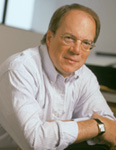
Vol. 76, No. 9, September
2003
Lifelong Service
Meet four founding bar members who epitomized
public leadership throughout their lives.
by George C. Brown,
State Bar executive director
 In 1891 four founders of the
Wisconsin State Bar Association took the oath of office as members of
the Wisconsin delegation to the 52nd U.S. Congress. William F. Vilas,
Nils P. Haugen, Allen Bushnell, and Thomas Lynch were the only lawyers
among the nine Representatives and two Senators who constituted the
11-member delegation. Only two delegates were Republicans; one of the
lawyers was a Republican, three were Democrats. Democrats controlled the
House of Representatives 235 to 88 Republicans, the largest Democratic
majority since the party was founded in 1828.
In 1891 four founders of the
Wisconsin State Bar Association took the oath of office as members of
the Wisconsin delegation to the 52nd U.S. Congress. William F. Vilas,
Nils P. Haugen, Allen Bushnell, and Thomas Lynch were the only lawyers
among the nine Representatives and two Senators who constituted the
11-member delegation. Only two delegates were Republicans; one of the
lawyers was a Republican, three were Democrats. Democrats controlled the
House of Representatives 235 to 88 Republicans, the largest Democratic
majority since the party was founded in 1828.
William Vilas. Born in Vermont in 1840, William
Vilas moved with his parents to Madison, Wis., at age 11. A graduate of
the U.W. and the University of Albany (N.Y.) Law School, Vilas was
admitted to the bar in 1860. After service in the Wisconsin Volunteer
Infantry during the Civil War, mustering out as a lieutenant colonel,
Vilas served as a law professor, university regent, reviser of the
Wisconsin statutes, and member of the Wisconsin assembly. In 1885,
President Grover Cleveland appointed Vilas U.S. Postmaster General,
probably in recognition of his service as chair of the 1884 Democratic
National Convention. In 1888, he was named U.S. Secretary of the
Interior, serving until 1889. Elected to the Senate in 1891, he served
one term. In honor of his service, the Wisconsin Legislature named Vilas
County for him in 1893. In 1897, he returned to law practice in Madison
and again was appointed a university regent in 1898. He died in 1908 and
is buried in Forest Hill Cemetery in Madison.
Nils P. Haugen. Born in 1849 in Modum, Norway, Nils
P. Haugen immigrated with his parents to Pierce County, Wis., in 1855.
He attended Luther College in Decorah, Iowa, and graduated from the
University of Michigan Law School in 1874. He was admitted to the bar
and began practicing law in River Falls that same year. After two terms
in the state assembly and five years as the state railroad commissioner,
Haugen was elected as a Republican in a special election to replace Rep.
William T. Price, who had died in office. Though elected in January
1887, Haugen was too ill to take his seat until a year later. Haugen
served during the 1891 term and was reelected until 1894. A failed
attempt to run for governor was followed by 20 years as a state tax
commission member. Haugen died in Madison in 1931 and is buried in
Forest Hill Cemetery.
Allen Bushnell. Born in Ohio in 1833, Allen Bushnell
attended Hiram College in Ohio, and moved in 1854 to Platteville, where
he studied law and was admitted to the bar in 1857. He served in the
Iron Brigade during the Civil War, was elected Grant County D.A. before
and after the war, and in 1875 was elected Lancaster's first mayor. His
service in 1886-90 as U.S. Attorney for the Western District of
Wisconsin prefaced his election to the House of Representatives and move
to Madison in 1891. He refused renomination and returned to the practice
of law, dying in Madison in 1909. He is buried in Hillside Cemetery in
Lancaster.
Thomas Lynch. Born in Granville, Milwaukee County,
Wis., in 1844, Thomas Lynch moved in 1864 to Chilton in Calumet County,
where he farmed and taught school. Elected to the state assembly in
1873, he graduated from the U.W. Law School in 1875. He was serving as
the Calumet County D.A. when he helped found the Wisconsin State Bar.
After two terms as D.A., he moved to Antigo in 1883, served as mayor in
1885 and 1888, and was elected as a Democrat to the 52nd and 53rd
Congresses (1891-95). He is buried in St. John's Cemetery, having died
in Antigo in 1898.
For these four lawyers, their role in forming the Wisconsin State Bar
Association was just one example of the public leadership they
demonstrated throughout their lives.
Wisconsin
Lawyer
